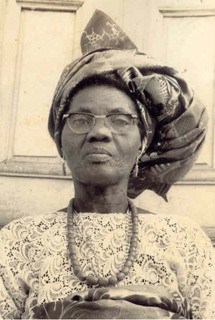|
On October 25, 1900 Francis Abigail Olufunmilayo Thomas was born in Abeokuta, Nigeria, to parents Daniel Olumeyuwa Thomas and Lucretia Phyllis Omoyeni Adeosolu. Kuti attended grammar school as a child in Abeokuta; she furthered her studies as a teen and young adult in England. As she completed her studies in England she returned home to serve as a teacher in her city. Around January of 1925, she married a man named Reverend Israel Oludotun Ransome Kuti. Mr. Kuti was a noble man who fought for equality for his people and he successfully established the Nigeria Union of Teachers and the Nigerian Union of Students. In 1965 Funmilayo Kuti received a national honor of membership within the Order of Nigeria; the honors were instituted by the National Honors Act No. 5 of 1964, during the Nigerian First Republic to honor Nigerians who have rendered service to the benefit of the nation. In 1968 she received an honorary doctorate of laws from the University of Ibadan. Kuti was a renowned activist and noted educator, as well as a leader within the women’s rights movement along with Elizabeth Adekogbe during the 1950’s. Kuti would also establish a women’s organization for the women in Abeokuta which holds a membership of over 20,000 women from all walks of life. Her next step was to raise public awareness about women’s rights when it comes to unfair pricing towards female merchants, the prices were not even and trade was a major economic component of the city. Kuti started the public protesting against the native authorities and the Alake of Egbaland; she presented the authorities with documents proving abuse by the Alake authorities. The documents proved that the Aleke granted Colonel Suzerain a member of the Government of the United Kingdom, the right to collect taxes. A separate tax rate was given to Nigerian women; as a result of the documents the tax rates were abolished and Colonel Suzerain gave up his position. Kuti founded the Federation of Nigerian Women Societies; the federation would later merge with the Women’s International Democratic Federation. As a long-time member of the National Council of Nigeria and the Cameroons, she advocated strongly for women’s rights. Kuti was subsequently expelled from the organization when she was not elected to a federal parliamentary seat. The spirit and will to fight for human rights earned Kuti an elected seat within the Nigerian House of Chiefs. Kuti was a world traveler but her travels caused the Nigerian Government to question her moves. She visited the USSR, Hungary, and China; because of this her passport was not renewed by her government. Her travels also caused the United States to refuse her entrance into the country. Kuti would later become one of the delegates who negotiated Nigeria’s independence from the British Government. In 1978 Funmilayo Kuti was thrown from a second floor window when her son Fela Kuti’s compound was raided by military personnel. She would later die as a result of her injuries on April 13, 1978. August of 2012, Funmilayo Kuti’s grandson Seun Kuti demanded an apology from the Nigerian government for the death of his grandmother, before they used her likeness on the N5000 Note which is Nigerian currency. Kuti was a dynamic woman who dedicated her life to helping others and fighting injustices, all while raising three remarkable sons. She was brilliant, relentless, fierce and nurturing. She helped make the life easier for Nigerian women by either starting or becoming a part of a number of women rights organizations. Funmilayo Ransome- Kuti, we stand on your shoulders. J.A. Ward. View the Funmilayo Ransome-Kuti video below
0 Comments
Leave a Reply. |
Details
Categories
All
Click Here to join our mailing list
|
Contact Us: |
Connect With Us |
Site powered by PIT Web Design


 RSS Feed
RSS Feed



